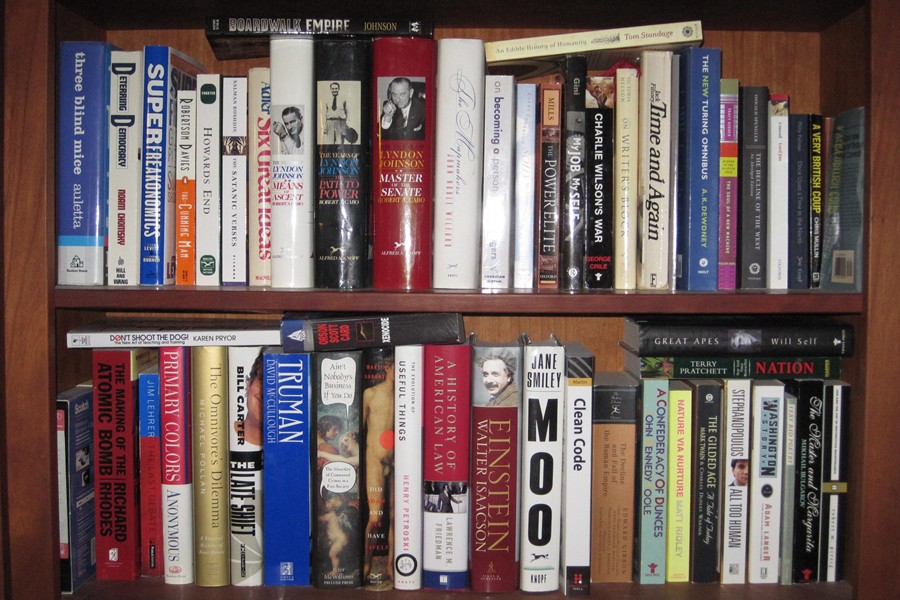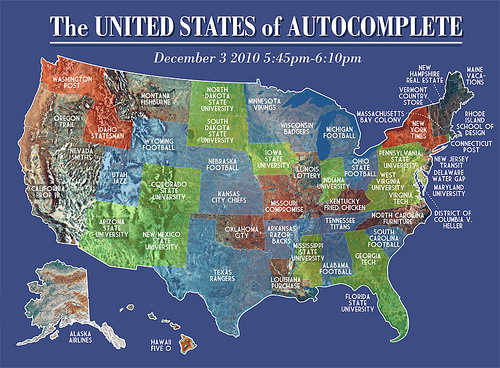Scott Adams thinks kids should learn how to compare, and I agree:
In our current system, the skills you need to compare alternatives are broken into little pieces and spread across several disciplines. A business student might learn about the time value of money while the psychology student is learning about confirmation bias. The math major is studying statistics while the religion student is learning that people will believe just about anything if the context is right.
Lacking the basic skills needed to compare alternatives, two people with different information and a couple of drinks can argue all night long and produce nothing but bad feelings. The same goes for people with different selfish interests and different ethical/moral standards. But people with good comparison skills can quickly find common ground. In our increasingly complex world, where different cultures are colliding, we'll all need a lot more talent for making the right comparisons.
Consider the budget debate in the United States. Every knowledgeable observer recognizes that the solution involves both deep cuts in expenses and higher taxes on those who can afford it. And yet our elected officials have framed the issue as one of higher taxes or not, and budget cuts or not. Politicians get away with false comparisons because the majority of voters are not trained in the skill of comparing. Borrowing a strategy from Gandhi, we need to become the change we seek in the government. Leaders will only make rational comparisons, and therefore rational decisions, when they know that the voters can tell the difference.
This is a great idea. It's important to keep in mind, however, that generally children have difficulty with abstract reasoning until they're 14-16 years old. Back in a previous life, in the 1990s, I tried teaching high school kids the basic fallacies of relevance. I had a small sample size, so I can't say my experience was statistically significant, but all the kids under 15 had trouble and all the kids over 16 mastered them with only a little effort.
Still, in a democracy, we need people who can reason; Adams's approach makes a lot of sense.
 Monday I cabbed out to the Gorilla Tango Theater near Chicago's Bucktown neighborhood for Chris Conley's and Kevin Sheehan's one-act play The Last Word. I loved it. I won't give anything away—at 30 minutes, any useful summary would spoil it—except to say that Sheehan and Conley have created an intriguing capsule of a world on GTT's tiny stage.
Monday I cabbed out to the Gorilla Tango Theater near Chicago's Bucktown neighborhood for Chris Conley's and Kevin Sheehan's one-act play The Last Word. I loved it. I won't give anything away—at 30 minutes, any useful summary would spoil it—except to say that Sheehan and Conley have created an intriguing capsule of a world on GTT's tiny stage.
Becky Blomgren (Grace) brought her character to life with the right blend of vulnerability and integrity it required. The character has an odd trait that her mentor/antagonist Mandy (Whitney LaMora) takes for granted but should surprise her Zenish-hippie friend Trish (Amber Olivier) and the earnest but touchingly clueless Libby (Rosa SanMarch). The play remains faithful to the reality it creates, so that Grace's talent not only makes sense, but drives the story to its satisfying conclusion.
Conley (who also directed) confessed to me she'd like to tighten up a couple of bits in the script, and I think I know what she means. I hope she and Sheehan get the chance; I'd love to see a longer version that, for example, shows more of the relationship between Grace and Mandy before the argument that opens the play. But maybe not; it's a gem as it is, and I'd like to see more of Conley's work in the future.
The Last Word has one remaining performance on January 31st at 8pm. Tickets are $12.
My reading stack has now passed my own height (175 cm):

This happened because:
- I spent 18 months reading a lot of stuff for school;
- Friends kept recommending books to me;
- There have always been books I really should read (like the three-volume biography of Lyndon Johnson my mom left me); and
- Amazon is just so convenient.
(Some of those are gifts, too.)
I have therefore declared a moratorium on buying books from Amazon until I get through at least one of those shelves.
Then there's the problem of the 12 movies stacked up on my DVD player I have yet to watch...
I meant to post this yesterday. Sullivan rounds up an entertaining collection of posts about post-punctuation spacing in the era of computerized typesetting:
Every modern typographer agrees on the one-space rule. It's one of the canonical rules of the profession, in the same way that waiters know that the salad fork goes to the left of the dinner fork and fashion designers know to put men's shirt buttons on the right and women's on the left. Every major style guide—including the Modern Language Association Style Manual and the Chicago Manual of Style—prescribes a single space after a period.
The Daily Parker has adhered to the one-space rule since the beginning of time. In fact, even when I used a mechanical typewriter as a kid, I never got into the habit of adding supernumerary spaces after punctuation. I feel for those poor lost souls who do.
My year in numbers:
Air miles flown: 66,674
Flight segments: 50 (Of those, arriving or departing O'Hare: 43)
Countries visited: 7 (UK, India, Japan, China, Finland, Russia, Estonia)
Hours working for pay: 1,488
Hours working for free: 128
Hours working for school: 848
Hours walking Parker: 146[1]
Blog postings: 398
Photos taken: 4,633
CDs purchased: 12
Books read: 51
Movies watched: 61 (In theaters: only 8, sadly)
But really, the only statistic that matters is:
Duke MBAs earned: 1
[1] He got much more walking than just this. He and I were separated on and off for about four months total while I traveled last year.
Via Bruce Schneier, a retired CIA codebreaker recently decoded a message sent to Confederate Lt. Gen. John Pemberton in July 1863:
The encrypted, 6-line message was dated July 4, 1863, the date of Pemberton's surrender to Union forces led by Ulysses S. Grant, ending the Siege of Vicksburg in what historians say was a turning point midway into the Civil War.
The message is from a Confederate commander on the west side of the Mississippi River across from Pemberton.
"He's saying, 'I can't help you. I have no troops, I have no supplies, I have no way to get over there,'" Museum of the Confederacy collections manager Catherine M. Wright said of the author of the dispiriting message. "It was just another punctuation mark to just how desperate and dire everything was."
That day, 4 July 1863, the Union not only captured Vicksburg but also prevailed at Gettysburg. Historians generally agree the two victories effectively ended any possibility of the Confederacy winning the war, though they would continue to fight for another 20 months.
The full text of the message to Pemberton reads:
"Gen'l Pemberton:
You can expect no help from this side of the river. Let Gen'l Johnston know, if possible, when you can attack the same point on the enemy's lines. Inform me also and I will endeavor to make a diversion. I have sent some caps (explosive devices). I subjoin a despatch from General Johnston."
The last line, Wright said, seems to suggest a separate delivery to Pemberton would be the code to break the message.
The news story has more details about how they found the message, and how they broke the code.
I'm not entirely sure what I think of this:
Amazon is working on a solution that could revolutionize digital gift buying. The online retailer has quietly patented a way for people to return gifts before they receive them, and the patent documents even mention poor Aunt Mildred. Amazon's innovation, not ready for this Christmas season, includes an option to "Convert all gifts from Aunt Mildred," the patent says. "For example, the user may specify such a rule because the user believes that this potential sender has different tastes than the user." In other words, the consumer could keep an online list of lousy gift-givers whose choices would be vetted before anything ships.
The proposal has also brought into focus a very costly part of the e-retailing business model: Up to 30 percent of purchases are returned, and the cost of getting rejected gifts back across the country and onto shelves has online retailers scrambling for ways to reduce these expenses.
Amazon's patent is 12 pages long, with numerous diagrams, including a "Gift Conversion Rules Wizard" that shows how a user could select rules such as, "No clothes with wool." The document makes for curious reading, reducing the art of gift giving to the dry language of patentry.
So, someone buys you a gift through Amazon, who in turn send you an email warning you about the gift, so you can take the money the other person paid and apply it to something you would prefer. That seems kind of...rude, don't you think?
On the other hand, it might cut economic deadweight loss around the holidays....
The patent is number 7,831,439.
From 1995, various historical figures answer the age-old question, "Why did the chicken cross the road?"
- Plato
- For the greater good.
- Karl Marx
- It was an historical inevitability.
- Machiavelli
- So that its subjects will view it with admiration, as a chicken which has the daring and courage to boldly cross the road, but also with fear, for whom among them has the strength to contend with such a paragon of avian virtue? In such a manner is the princely chicken’s dominion maintained.
- Hippocrates
- Because of an excess of light pink gooey stuff in its pancreas.
- Jacques Derrida
- Any number of contending discourses may be discovered within the act of the chicken crossing the road, and each interpretation is equally valid as the authorial intent can never be discerned, because structuralism is DEAD, DAMMIT, DEAD!
- Torquemada
- Give me ten minutes with the chicken and I’ll find out.
- Timothy Leary
- Because that’s the only kind of trip the Establishment would let it take.
- Douglas Adams
- Forty two.
- Nietzsche
- Because if you gaze too long across the Road, the Road gazes also across you.
- Oliver North
- National security was at stake.
- B.F. Skinner
- Because the external influences which had pervaded its sensorium from birth had caused it to develop in such a fashion that it would tend to cross roads, even while believing these actions to be of its own free will.
- Carl Jung
- The confluence of events in the cultural gestalt necessitated that individual chickens cross roads at this historical juncture, and therefore synchronicitously brought such occurrences into being.
- Jean–Paul Sartre
- In order to act in good faith and be true to itself, the chicken found it necessary to cross the road.
- Ludwig Wittgenstein
- The possibility of “crossing” was encoded into the objects “chicken” and “road,” and circumstances came into being which caused the actualization of this potential occurrence.
- Albert Einstein
- Whether the chicken crossed the road or the road crossed the chicken depends upon your frame of reference.
- Aristotle
- To actualize its potential.
- Buddha
- If you ask this question, you deny your own chicken-nature.
- Howard Cosell
- It may very well have been one of the most astonishing events to grace the annals of history. An historic, unprecedented avian biped with the temerity to attempt such an herculean achievement formerly relegated to homo sapien pedestrians is truly a remarkable occurence.
- Salvador Dali
- The Fish.
- Darwin
- It was the logical next step after coming down from the trees.
- Emily Dickinson
- Because it could not stop for death.
- Epicurus
- For fun.
- Emerson
- It didn’t cross the road; it transcended it.
- Goethe
- The eternal hen–principle made it do it.
- Hemingway
- To die. In the rain.
- Heisenberg
- We are not sure which side of the road the chicken was on, but it was moving very fast.
- David Hume
- Out of custom and habit.
- Saddam Hussein
- This was an unprovoked act of rebellion and we were quite justified in dropping 50 tons of nerve gas on it.
- Jack Nicholson
- ’Cause it (censored) wanted to. That’s the (censored) reason.
- Pyrrho the Skeptic
- What road?
- Ronald Reagan
- I forget.
- John Sununu
- The Air Force was only too happy to provide the transportation, so quite understandably the chicken availed himself of the opportunity.
- The Sphinx
- You tell me.
- St. Peter
- I tell you, I don’t know any chicken.
- Thoreau
- To live deliberately...and suck all the marrow out of life.
- Mark Twain
- The news of its crossing has been greatly exaggerated.
- Herbert Marcuse
- It was beguiled by false needs. Evidently, it was under the impression that the other side of the road was even better than the side it was already on.
- Emile Durkheim
- The chicken may have been an individual seeking to express its moral imperative in doing the right thing.
- George H.W. Bush
- Chicken. Road. Crossed it. Just because.
- Rush Limbaugh
- Get back here, I’m still hungry! The darn thing just up and took off! And that was not the right thing to do.
- Bill Clinton
- Well, it could have crossed the road, for some reason, which we will determine after a period of study.
- Sinead O’Connor
- “Flee chicken! Flee and be free!” The chicken wanted freedom from the chicken–eating big people.
- Captain Kirk
- Perhaps/probably/it seems/to which direction did the chicken go? Bones? Scotty? Spock?
- Bones
- Dammit Jim, I’m a doctor, not a Colonel!
- Scotty
- She’s criss–crossed like a Christmas tree! I’ll need more time!
- Spock
- Logic suggests the chicken required itself to be on the other side of the road. For which purpose cannot be determined at this time.
- Picard
- Is it moral to interfere with the chicken’s choices?
- Troi
- I sense something from the chicken, sir. It’s definitely across the road.
- Worf
- Tasty.
- Karl Marx
- In order for the chicken to have increased meat mass, the capitalists required the chicken to cross the road several times.
- Dustin Hoffman in The Graduate
- Can we talk about this? I mean, I’m not so happy right now and I’d rather not answer the question.
- F. Lee Bailey
- Objection, your Honor. My opponent is leading the chicken.
- Spike Lee
- It’s a chicken thing. You wouldn’t understand.
- Billy Crystal in When Harry Met Sally...
- You know, chickens and ducks can never really be friends.
Strange Maps finds our state mottoes through Google:
Google any word, and the search engine will suggest a longer phrase, based on the popularity of current searches starting with the same word.
This so-called autocomplete function (1) is, like any good advice, in equal parts helpful and annoying. Also, being a clever piece of statistics, it offers a fascinating insight into the mind(s) of the Great Online Public.
The same principle of random revelation can be applied to geographic terms, which is exactly what this map does. These United States of Autocomplete have been collated simply by typing in the name of each US state, then plotting the autocompleted results on an actual map of the US.

Montana's, and Washington's are, for different reasons, the most surprising.
Via Sullivan, who spends all day surfing the net so you and I don't have to: